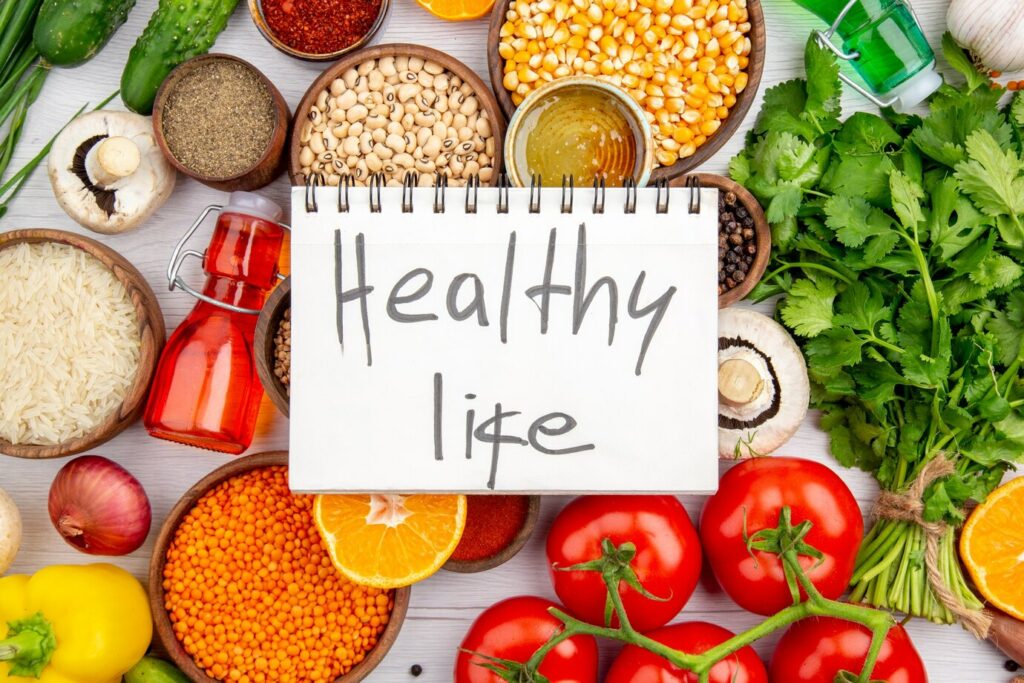Inflammation is a natural bodily response to injury or infection, but when it becomes chronic, it can contribute to various health problems. One of the most effective ways to manage chronic inflammation is through diet. A Veg Anti-Inflammatory Diet focuses on plant-based foods that help reduce inflammation and promote better health.
What is Inflammation?
Inflammation is your body’s way of protecting itself from harmful agents like bacteria, viruses, and damaged cells. It’s a normal part of the healing process, but when inflammation sticks around too long, it can damage tissues. This can lead to diseases like arthritis, heart disease, and diabetes. Keeping inflammation under control is crucial for long-term health, and your diet plays a big role in managing it.

Foods That Cause Inflammation (Veg Options Only)
While certain foods can help reduce inflammation, others can make it worse. Here are some common vegetarian foods that can contribute to inflammation:
1. Refined Carbs
Foods like white bread, pasta, and pastries made from refined flour can spike your blood sugar and promote inflammation.
2. Sugary Foods
Sugary snacks, soft drinks, and fruit juices often contain high amounts of sugar or high-fructose corn syrup, which can trigger inflammation in the body.
3. Trans Fats
In packaged snacks, margarine, and some vegetable oils, trans fats increase inflammation.
4. Certain Plant Oils
Oils like sunflower, soybean, and corn oil are high in omega-6 fatty acids, which, when consumed in excess, can contribute to inflammation by disrupting the balance of omega-3s in your body.
How Cooking Methods Affect Inflammation
The way you prepare your food can impact its anti-inflammatory benefits. Some cooking methods preserve the anti-inflammatory properties of food better than others.
1. Steaming and Boiling
Steaming or lightly boiling vegetables helps retain their nutrients and antioxidants, making them more effective at fighting inflammation.
2. Roasting and Grilling
While roasting and grilling can enhance flavours, they may reduce certain nutrients, so it’s important not to overdo the heat.
3. Avoid Deep-Frying
Frying in unhealthy oils can create compounds that may increase inflammation, so it’s best to stick to healthier cooking methods like sautéing or baking.
4. Fermentation
Fermented foods like idli, dosa, kimchi, and curd are great for gut health and play a key role in controlling inflammation. There are many fermented foods available, and you can choose based on what your body needs.
Processed Foods: What to Watch Out For
Processed foods can be loaded with sugars, unhealthy fats, and additives that promote inflammation. Reading labels is crucial to avoid hidden ingredients that might trigger inflammation.
1. Hidden Sugars
Processed foods often contain sugars that aren’t always obvious, like high-fructose corn syrup, which can fuel inflammation.
2. Unnecessary Additives
Preservatives, artificial colourings, and flavourings can negatively impact your health while promoting inflammation.
3. Look for Whole Ingredients
Choose packaged foods as close to their natural form as possible, such as whole grains, legumes, and fresh produce.
What is an Anti-Inflammatory Diet?
An anti-inflammatory diet focuses on foods that help reduce inflammation in the body while avoiding those that may trigger it. You should know that an anti-inflammatory diet can vary from person to person, so the success of an anti-inflammatory diet is hidden behind knowing what suits your body and what doesn’t. When you have a checklist of Do’s and Don’ts you create an anti-inflammatory diet that can yield results.

Anti-Inflammatory Foods to Include (Veg Only)
On the flip side, many plant-based foods are packed with anti-inflammatory compounds that can help reduce chronic inflammation. Here are some of the best anti-inflammatory foods to include in your diet:
1. Leafy Greens
Vegetables like spinach, kale, and Swiss chard are full of antioxidants and anti-inflammatory compounds like vitamins A, C, and K.
2. Berries
Blueberries, strawberries, and raspberries are rich in antioxidants called anthocyanins, which have strong anti-inflammatory effects.
3. Nuts and Seeds
Almonds, walnuts, chia seeds, and flaxseeds are excellent sources of healthy fats and omega-3s, which help reduce inflammation.
4. Turmeric
Turmeric contains curcumin, a powerful anti-inflammatory compound. Add turmeric to your meals to help lower inflammation.
5. Ginger
Ginger has been shown to reduce inflammation and can also aid in digestion. It’s perfect in smoothies, teas, or as a spice in cooking.
6. Olive Oil
Extra virgin olive oil is rich in antioxidants like oleocanthal, which helps reduce inflammation. Use it as your primary cooking oil.
7. Tomatoes
Tomatoes contain lycopene, a potent antioxidant that helps fight inflammation, especially when cooked.
How to Eat to Reduce Inflammation: Start with Small Changes
Fighting inflammation doesn’t have to be overwhelming. You can start by making simple changes to your meals that add anti-inflammatory foods and remove pro-inflammatory ones. Here are some tips:
1. Fill Your Plate with Color
Choose a variety of colourful fruits and vegetables to ensure you’re getting a wide range of antioxidants and anti-inflammatory compounds.
2. Choose Whole Grains Over Refined Grains
Switch to whole grains like quinoa, brown rice, and oats, which are rich in fibre and help combat inflammation.
3. Add Healthy Fats
Include healthy fats like those in olive oil, avocado, and nuts. These fats are essential for fighting inflammation and supporting overall health.
4. Use Anti-Inflammatory Spices
Turmeric, ginger, and cinnamon are great additions to your meals due to their anti-inflammatory properties. Try adding them to soups, curries, or even smoothies.
5. Drink Anti-Inflammatory Teas
Green tea and ginger tea are rich in polyphenols that help reduce inflammation. Sip them throughout the day to support your anti-inflammatory efforts.
You Can Fight Inflammation with the Right Diet
Chronic inflammation is a serious concern, but the good news is that diet plays a key role in reducing it. By focusing on a Veg Anti-Inflammatory Diet, you can nourish your body with foods that promote healing, reduce inflammation, and improve overall health.
Every meal is an opportunity to choose foods that support your well-being. With a few simple changes, you can reduce inflammation, boost your immune system, and enjoy better long-term health.
The best approach to following an Anti-Inflammatory Diet is to consult with your dietician or nutritionist first and then follow the diet plan.
Celebrity Success Stories with the Anti-Inflammatory Diet
Some well-known celebrities have turned to the anti-inflammatory diet to achieve their health and weight-loss goals. Actress Vidya Balan is one of them. She shared her transformative experience in a now-viral video, explaining how the anti-inflammatory diet helped her shed the weight she had struggled with for years.
In an interview with Galatta Plus, Vidya said, “All my life, I’ve struggled to be thin. I’ve tried countless diets and exercise routines. Sometimes I would lose weight, but it always came back. Earlier this year, I connected with a nutrition group in Chennai called Amura Health. They explained that it wasn’t about fat—it was about inflammation. They put me on an anti-inflammatory diet, and the results were incredible. The weight just melted away once we eliminated the foods that didn’t suit me.”

Similarly, Samantha Ruth Prabhu recently shared her journey with the anti-inflammatory diet during an Instagram Q&A. She mentioned that she had been following a “strict anti-inflammatory diet,” which garnered praise after fans noticed positive changes in her physique and overall well-being.

Disclaimer: We do not have any expertise on the subject and all the above information is curated from different sources available on the web. So, before following the Anti-Inflammatory Diet, please consult the subject specialist first.

